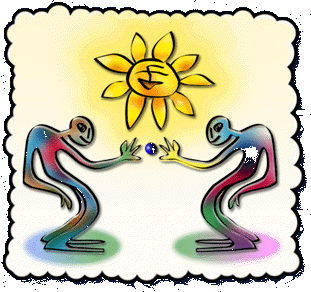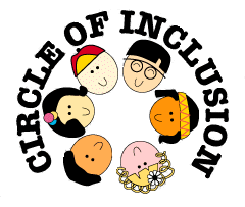5/22/2006
Intercultural learning and the other
 I am writing an application for an EU fund, for a 3 years training programme for a youth center in Ommen. I was thinking that Levinas' philosophy is really relevant for intercultural learning. I proposed to write something about that as an attachment for the application and the organisation agreed. I suppose this text is much too long, but I first wanted to follow my own thoughts, I will make it shorter later...
I am writing an application for an EU fund, for a 3 years training programme for a youth center in Ommen. I was thinking that Levinas' philosophy is really relevant for intercultural learning. I proposed to write something about that as an attachment for the application and the organisation agreed. I suppose this text is much too long, but I first wanted to follow my own thoughts, I will make it shorter later...With the many countries that are taking part in the training programme, a considerable cultural diversity will be present in the training. In our trainings, the Olde Vechte tries to focus on what the participants have in common. We will concentrate on universal aspects of human thinking, feeling and acting, not too much on cultural differences.
Reason for this is that when you focus on cultural differences, that the risk of “labeling” others becomes big. Like: “Oh, I can see that you are typically Dutch, because you behave like this and that, a clear example of how the Dutch are all the same.” Humans are unique beings, you cannot find two persons in the whole world – no matter how much their personal background is similar – who are exactly the same (even not coming close to that, not even for twins). Nobody can stand in somebody else’s shoes. We cannot be reduced to our presumed (by others) characteristics, we cannot be reduced to the country, culture, religion, race or class that we belong to, we have our own unique identity which is so much more than just the groups / categories that we belong to.
The idea that we should treat every other person as a unique individual, without reducing that person to a collective category, is the central theme of the humanistic philosophy of the Jewish thinker Emmanuel Levinas.
“To be in direct relation with the Other, is not to thematize the Other, not to consider him in the same manner as one considers an object. In reality, the fact of being is what is most private; existence is the sole thing I cannot communicate; I can tell about it, but I cannot share my existence. Solitude thus appears as the isolation which marks the very event of being.”
I cannot stand in the shoes of somebody else, I can always only think my own thoughts. When I am alone, I am locked up in my own consciousness, there is only me and the objects around me. I can do to these objects what I like, since the objects cannot protest. But as soon as a person meets another person, the situation becomes totally different. Now I cannot treat that person as an object anymore, because what I do to him or her affects that person, affect another consciousness who has the same human rights as I have. So I can’t do just anything, I have to take the other into account. The way that I will start to realize this, is because the other makes an appeal to me, before I realize what’s happening. The other doesn’t accept that I try to reduce him or her to an object, it is the other consciousness which is resisting my attempt. It’s the appeal from the other which is done to me, which wakes me up from the selfish and isolated way that I was looking at the world, as if the whole universe is centered around me. Because I have to take the other into account, our relation becomes ethical. If I dehumanize the other my behaviour is morally bad. If I open myself up for the other and take my responsibility to listen to his appeal, then my behaviour is morally good.
Before I started to think, reflect on this, before I realize what is happening, the other already made an appeal to me. The humanism from Levinas is not a dogmatic set of rules telling people how they should live, it’s an explanation of a phenomenon that happens automatically: the other makes an appeal to me and through that our relation becomes ethical.
 What the other says to me in the first place – when I look into his face – is: “don’t kill me”. The command “thou shalt not kill” can sometimes refer to killing in a literal sense, but it can also refer to the attempt from the first person to reduce the other to an object.
What the other says to me in the first place – when I look into his face – is: “don’t kill me”. The command “thou shalt not kill” can sometimes refer to killing in a literal sense, but it can also refer to the attempt from the first person to reduce the other to an object.With regard to the example I gave before, that I say to somebody: “Oh, I can see that you are typically Dutch, because you behave like this and that”; this is a way of reducing the other to an object, to the category of being Dutch. It’s a category with general collective characteristics. The other probably possesses some of these characteristics, but not all of them, and he also has got many other characteristics, which are probably not typically Dutch.
Who am I to label that person as typically Dutch, who am I to determine for him what he is like in essence? When I define / label him like that, I invent an image of him and I put that image on his forehead. After that I don’t look at or listen anymore to the real person, I only look at the image, the object that I invented. At that moment I dehumanize the other person, I treat him as an object.
This process of dehumanization can very easily lead to prejudices, discrimination and in the end to racism. Racism is a specific form of dehumanization of the other, based on race. Human beings are no longer treated as equal human beings, but as objects to which you can do what you like, who don’t have any rights and who cannot speak anymore, who aren’t being heard.
 Sometimes cultures with different values will collide when they are confronted with each other. When people are not open-minded and tolerant, when they don’t try to understand each other and to search for a way to come closer to each other and to bridge differences and misunderstandings, the fear and hate for “the other” might grow. Both groups start to behave more aggressively towards each other. They withdraw themselves in their own community. The us vs them feeling is growing, and their own group is considered to be completely good and the other group as completely bad / evil. An image is invented in the minds of the first group in which the other group consists of demons. This is the process of dehumanization. Demons are completely evil, they are no longer considered as equal human beings, and that means that you can be aimed at their destruction, you can treat them as objects.
Sometimes cultures with different values will collide when they are confronted with each other. When people are not open-minded and tolerant, when they don’t try to understand each other and to search for a way to come closer to each other and to bridge differences and misunderstandings, the fear and hate for “the other” might grow. Both groups start to behave more aggressively towards each other. They withdraw themselves in their own community. The us vs them feeling is growing, and their own group is considered to be completely good and the other group as completely bad / evil. An image is invented in the minds of the first group in which the other group consists of demons. This is the process of dehumanization. Demons are completely evil, they are no longer considered as equal human beings, and that means that you can be aimed at their destruction, you can treat them as objects.Levinas offers tools and insight in how this process can be counteracted. The appeal from the other to me, the request to respond, it reaches me as soon as I look in the face of the other. So I should take my responsibility to respond. Instead of killing the other by inventing an image of him and treating him as an object, I should look the other in the eyes with an open mind, and listen to what that person has to say to me. If the other asks me for help I should help him if I can, unconditionally. I should welcome the stranger with open arms, unconditionally. I should realize that every other person is totally different from me, I am the only one who is thinking my own thoughts, I should not claim to possess the thoughts of another person, I should leave that up to him or her.
Inclusion means...
 (Intercultural) skills are needed to learn how to treat another person – no matter where he comes from – with respect. Skills like to show empathy, to be patient, to listen carefully, to be able to put your own views and prejudices aside for a while, etc.
(Intercultural) skills are needed to learn how to treat another person – no matter where he comes from – with respect. Skills like to show empathy, to be patient, to listen carefully, to be able to put your own views and prejudices aside for a while, etc.Clear communication is a very good tool to bridge cultural gaps. When people are able to speak the same language, to understand each other, they can come closer to each other without having to give up their own identity. The amount that people can understand from others is very big, even if they come from the other side of the world. Cultural differences are not the only or the main differences. Personal differences are also very big. So maybe I am very different from my neighbor and similar to a stranger from far away.
To stop a process of dehumanization, concrete and intensive contact is very important. Prejudices don’t disappear with abstract information, they disappear when you meet real persons who don’t match with the image you had. When you get to know real persons from a different culture, you discover that you have many values, ideas and interests in common (like there are also many disagreements, but you will have these also with people from your own culture). And you see that they are individuals with their own characteristics, some of them you like, others you don’t like. But you start to see them as real people, not anymore as abstract categories. And with real people you have to think about how you treat them, what you are doing to them. You should not hurt them unnecessary. The more abstract and anonymous another culture is in the eyes of a person, the easier it will be to support inhuman behavior towards them. That is why it is very important to organize this kind of international and intercultural trainings - with an intensive contact between the participants and with the use of clear methods to improve intercultural contact as central elements.
Comments:
<< Home
Hi,
Do you know about this group Global link? They are active in UK and here in this small town of Lancaster in north of England. Here is the link, take a look. I have been to their exhibitions and promotional work they are doing here and there to raise public awareness on refugees and asylum seekers. Sara one member of the group is active in our Language, Ideology and Power research groupin Linguistics department. Take a look, may be you can do something together.
Here is the link. Let me know what you think. I can contact Sara.
http://www.globallink.org.uk/
Majid
www.lancastermaze.blogspot.com
Post a Comment
Do you know about this group Global link? They are active in UK and here in this small town of Lancaster in north of England. Here is the link, take a look. I have been to their exhibitions and promotional work they are doing here and there to raise public awareness on refugees and asylum seekers. Sara one member of the group is active in our Language, Ideology and Power research groupin Linguistics department. Take a look, may be you can do something together.
Here is the link. Let me know what you think. I can contact Sara.
http://www.globallink.org.uk/
Majid
www.lancastermaze.blogspot.com
<< Home

